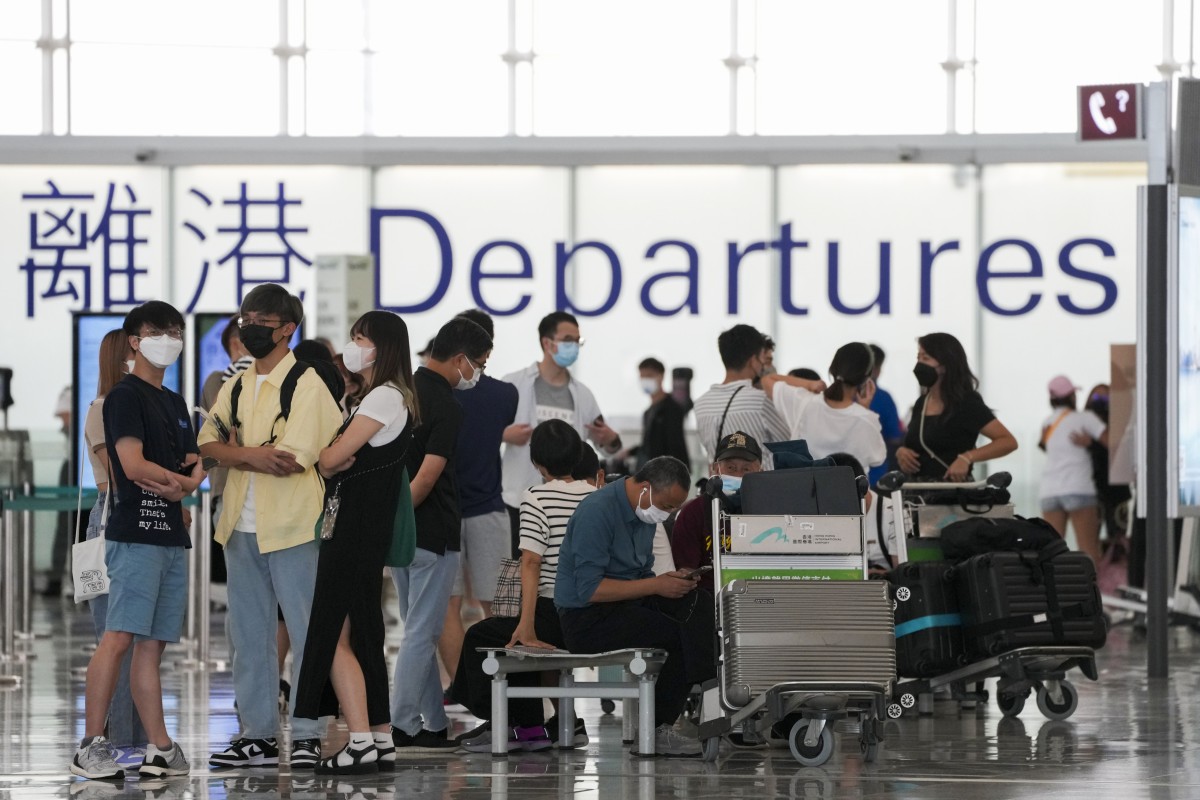
- Nearly third of 142,000 Hongkongers who have applied to scheme that leads to UK citizenship are under 18, while those aged 25 to 54 make up majority
- Britain plans to extend the scheme later this month to allow Hongkongers born on or after July 1, 1997, who have at least one parent with BN(O) status to apply independently to settle in the country
 As of June, a total of 133,124 Hongkongers have been approved for the citizenship route since the scheme was launched. Photo: Sam Tsang
As of June, a total of 133,124 Hongkongers have been approved for the citizenship route since the scheme was launched. Photo: Sam TsangNearly a third of 142,000 Hongkongers who have applied for a special visa that leads to British citizenship are under 18, while those aged 25 to 54 make up the majority, official figures obtained by the Post show.
Experts said the age profile suggested the government needed to do more to retain home-grown talent, not just attract non-local professionals, referring to a raft of measures announced last month to make the city more enticing to mainland Chinese and expatriates.
Between January 31, 2021, when the pathway opened and June 30 this year, 38,600 applications for the British National (Overseas) visa were from Hongkongers under 18, of which just 16 per cent were filed from Britain, according to figures from the UK Home Office obtained by the Post.
What is Britain offering BN(O) passport holders?
Hongkongers aged 35 to 44 made up the next biggest group at 32,600, with 13 per cent of those applications made inside the country. The third-largest demographic consisted of those aged 45 to 54, who made 27,800 applications, of which 14 per cent were filed in Britain.
Hongkongers aged 25 to 54 made up 55 per cent – or 78,100 applications – of those applying for the special visa. As of June, a total of 133,124 Hongkongers have been approved for the citizenship route since the scheme was launched, according to figures released by the Home Office in August.
An estimated 5.4 million of Hong Kong’s 7.5 million residents are eligible for the pathway, which allows successful applicants and their dependants to live, work, and study in Britain for up to five years, after which they can apply for citizenship.
Britain granted BN(O) status to 3.4 million Hong Kong residents born before the 1997 handover, when the city returned to Chinese sovereignty.
Britain launched the visa pathway after Beijing imposed the national security law on Hong Kong in June 2020, which the UK described as a “clear and serious breach” of the 1984 Sino-British Joint Declaration that laid out the conditions for the city’s return to Chinese rule. The law, enacted following anti-government protests, bans acts of secession, subversion, terrorism and collusion with foreign powers.
Immigration consultants said the data confirmed what they were witnessing in person, which was Hongkongers aged between 30 and 50 years old were planning to emigrate so their children could study in Britain, with fewer elderly people moving with their family members.
Willis Fu Yiu-wai, a senior immigration consultant at Goldmax Associates, said his company usually handled families who planned to move together. “The major purpose of the [applications] is to plan for a brighter future for the next generation, that is their children,” he said.
China to stop recognising British National (Overseas) passports
Margaret Szeto, founder of migration consultation company Aura Global, agreed many parents were motivated to ensure their children could study in the UK under the benefits of the BN(O) scheme.
With Hongkongers aged 18 to 24 making up one of the smallest groups, at 6,100 applications, Szeto said young people were choosing to take other migration routes provided by countries, such as Canada, which unveiled two new paths to permanent residency last June.
“They only have to work in Canada for one year before they can obtain permanent residence status, which is faster than the six years required for a BN(O) visa,” Szeto noted.
Migration from Hong Kong to Canada soars to levels unseen since 1998
The UK plans to extend the BN(O) visa scheme later this month to allow Hongkongers born on or after July 1, 1997, who have at least one parent with BN(O) status to apply independently to settle in the country. Currently, only those born before June 30, 1997, the day before the city’s handover, are eligible, making even the youngest recipients 25.
Professor Paul Yip Siu-fai, associate dean at the University of Hong Kong’s faculty of social sciences, estimated that 50,000 families either planned to or had moved to Britain since the scheme began. With professionals making up a large portion, he warned both the skill set and numbers of those leaving were not easily replaced.
Yip said he hoped the government would not merely put an emphasis on attracting foreign talent to the city but also on retaining locals too because both were needed for Hong Kong’s development.
“A lot of people might come for a couple of years, then they will leave. But now we are losing this group who should be staying,” he said. “That is something that we have to be more careful [of].”
The smallest group of applicants were over the age of 65, at 6,000.
The Post reported last June that many eligible elderly residents refused to go to Britain for various reasons such as being unable to speak English, not wanting to uproot at a late stage in life or a reluctance to leave friends and other relatives.
Yip estimated that about 10,000 elderly in Hong Kong could be affected by the emigration to Britain if all of their children had left, as carers were departing a city already coping with an ageing population, which could place an additional burden on the government.
Is Hong Kong facing a brain drain?
Professor Eric Fong Wai-ching, an expert in migration and urban sociology at the University of Hong Kong, said retaining talent was a “crucial issue”.
He pointed out that a majority of the applications were made by those of “prime working age” who could have reached management positions in the coming years.
“Hopefully, the government will address some of their concerns … and make them feel that they are important to the society, and then at the same time, I think the authorities should maybe work with companies to see if anything can be done to help retain them.”
Chief Executive John Lee Ka-chiu announced last month a slew of measures to attract talent, including extending the stay of non-local students and offering incentives to encourage foreign professionals to buy homes and settle in the city.